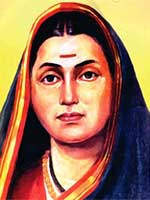Socio Political Mentors
If you give me bread, you have fed me for day. If you teach me to earn, then you have fed me until the Opprtunity of Livelihood is snatched, agricultural land is sold-off and my representation and participation in policy is denied. But, if you educate and capacitate me to organise, then whatever the challenge, I can join together with my community and we will develop our own solution.

Savitribai Jyotirao Phule (3 January 1831 – 10 March 1897) was an Indian social reformer and poet. Along with her husband, Jyotirao Phule, she played an important role in improving women's rights in India during British rule. The couple founded the first women's school at Bhide Wadai in Pune in 1848. She also worked to abolish discrimination and unfair treatment of disenfranchised citizens based on religion, caste, and race. At age 17, she became the youngest teacher in India. Savitribai Phule is considered a pioneer of modern Marathi poetry.
Savitribai Phule was born in 1831 in Naigaon, Maharashtra. Her family were farmers. At the age of nine, she was married to thirteen year old Jotirao Phule in 1840. Savitribai and Jotirao had no children of their own.. However, the couple adopted Yashavantrao, who was the son of a widowed Brahmin.
Savitri worked as both an educational reformer and social reformer, especially for women. During the 19th century, young girls were sometimes placed into arranged marriages. Since mortality rates were high, these girls often were widowed while still children. Due to social and cultural practices of the times, prospects for these young girls were poor. Customarily, the heads of the widows were clean shaven, to make them unattractive prospective suitors. Savitribai and Jyotirao were moved by the plight of these girls. They organized a strike against the barbers to persuade them to stop shaving the heads of widows.
Also, these helpless women, with no way to refuse this treatment, were easy prey for rapists. Widows who became pregnant due to rape would resort to suicide or killing the newborn for fear of being ostracized by the society. Once, Jyotirao stopped a pregnant lady from committing suicide, promising her to give her child his name after it was born. Savitribai accepted the lady in her house and helped her deliver the child. Savitribai and Jyotirao later adopted this child, who grew up to become a doctor. Savitribai and her husband established a center for caring for pregnant rape victims and delivering their children.
The care center was called "Balhatya Pratibandhak Griha." Savitri ran the home and considered all the children born in the home her own.Moved by the treatment of the untouchables, who were refused drinking water meant for the upper caste, both Jyotirao and Savitribai opened up their well to the untouchables. In 1868, Savitribai welcomed Dalit to take water from her well.
Tiffany Wayne has described Phule as "one of the first-generation modern Indian feminists, and an important contributor to world feminism in general, as she was both addressing and challenging not simply the question of gender in isolation but also issues related to caste and casteist patriarchy."
Savitribai Phule and her adopted son, Yashwant, opened a clinic to treat those affected by the worldwide Third Pandemic of the bubonic plague when it appeared in the area around Pune in 1897. The clinic was established at Sasane Mala, Hadapsar, near Pune, but out of the city in an area free of infection. Savitribai personally took patients to the clinic where her son treated them. While caring for the patients, she contracted the disease herself. She died from it on 10 March 1897.
